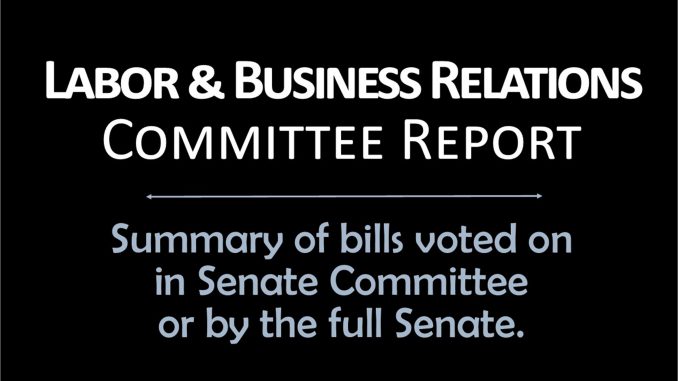
SF 2110–Disqualification for unemployment benefits (Misconduct);
SF 2190—Limiting Administrative Rules;
SSB 3156—Electronic wage statements.
COMMITTEE ACTION:
SF 2110 establishes a new definition of “misconduct” relating to individual’s eligibility for unemployment benefits. Under current law, an individual is disqualified from eligibility for unemployment benefits if the Department of Workforce Development finds that they have been removed from their job for misconduct in connection with their employment. “Misconduct” is not currently defined in Iowa Code. It is defined extensively in Administrative Rules.
Under this bill, as amended in committee, misconduct occurs in certain circumstances, including:
- Falsification of an employment application.
- Failure to maintain any license, registration or certification required to perform their job, unless the failure is not within their control.
- Damage to the employer’s property through grossly negligent conduct.
- Disregard for the employer’s interests in performing job duties under the employer’s employment policies.
- Damage to the employer’s property through grossly negligent conduct.
- Refusal to obey an employer’s reasonable and lawful instructions, unless the refusal is due to the lack of ability, skills or training, or the instruction would require an unsafe act.
- Consumption of alcohol or illegal or non-prescribed prescription drugs or use of an impairing substance in an off-label manner on the employer’s premises during working hours in violation of the employer’s employment policies.
- Reporting to work under the influence of alcohol, illegal or non-prescribed prescription drugs unless the individual is compelled to report to work by the employer outside of scheduled or on-call working hours and informs the employer prior to or upon arrival at the workplace.
- Grossly negligent conduct that endangers the safety of the individual, coworkers or public.
- Conduct that is defamatory toward the employer or another employee if such conduct is not protected under federal or state law.
The bill prohibits the Department of Workforce Development from considering past misconduct when determining eligibility for unemployment benefits.
[2/14: 7-4, party-line]
SF 2190 limits the number of rules in the Iowa Administrative Code on January 1, 2019, not exceed the number of rules on July 1, 2018. Further, the bill requires the number of rules on January 1, 2022, not exceed two-thirds of the number on July 1, 2018.
The bill requires the Department of Management, in consultation with the Administrative Rules Coordinator, Administrative Code Editor and the Administrative Rules Review Committee, to establish and implement a process across all agencies to facilitate rule making necessary to implement SF 2190.
By January 5 each year, the Department of Management will submit a report to the Legislature and Governor on the number of rules in the Iowa Administrative Code. The bill is effective upon enactment.
[2/14: 7-4, party-line]
SSB 3156 permits employers to provide wage statements by secure electronic transmission or other secure electronic means. This is in addition to the option to provide the statement by mail or in person, or allow the employee to view and print the statement for free. If the employee is unable to receive the statement by electronic means, they must notify the employer in writing, at least one pay period in advance, and the employer will provide the statement by mail or in person, or allow the employee to view and print the statement for free. Iowa Code requires the wage statement to show the hours the employee worked, wages earned and deductions taken.
[2/14: short form]
